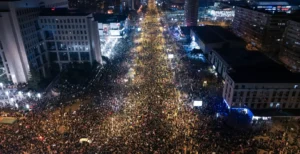Date: January 7, 2025
Time: 14:00
Key Findings
Chemical Factories Linked to Russian Defense
Chemical factories owned by Russian billionaires have been identified as critical suppliers to Russia’s military-industrial complex, directly supporting the war effort in Ukraine.
Connections Between Wealth and Military Support
Oligarchs close to the Kremlin are leveraging their industrial assets to provide crucial materials for weapons production, including explosives and missile propellants.
Sanctions Ineffectiveness Highlighted
Despite international sanctions targeting Russian oligarchs, many of their businesses remain operational and continue to support military activities.
Billionaires’ Industries Supporting War
Russian billionaires with close ties to the Kremlin are using their chemical factories to bolster Russia’s war machine. These industrial facilities play a key role in supplying essential materials for weapons production, raising concerns over the efficacy of sanctions and the ethical implications of their operations.
The Role of Industry in Russia’s War Effort
Russia’s military-industrial complex heavily depends on domestic industries to sustain its operations. During the war in Ukraine, chemical factories have emerged as crucial players, supplying materials for explosives and missile components. These industries are predominantly controlled by a small group of oligarchs who have maintained close ties with President Vladimir Putin and his administration.
Factories’ Role in Military Supply
Chemical factories across Russia, owned by oligarchs like Dmitry Mazepin and Arkady Rotenberg, are producing and supplying materials directly used in military hardware. Explosive precursors and missile propellants produced in these facilities are critical for sustaining Russia’s offensive capabilities in Ukraine.
International sanctions have targeted many of these individuals, yet loopholes and enforcement challenges allow their businesses to continue contributing to the war effort.
The Impact of Sanctions and Industrial Support
The ineffectiveness of sanctions highlights the resilience of Russia’s industrial base in the face of international pressure. Oligarchs have found ways to circumvent restrictions, using offshore entities and domestic networks to maintain operations. This underscores the need for stronger enforcement mechanisms and a focus on closing loopholes that allow war-related industries to thrive.
Possible Consequences of Continued Support
If these industrial contributions remain unchecked, Russia’s military capabilities will continue to be bolstered, prolonging the conflict in Ukraine. However, increased global pressure and targeted sanctions could disrupt these operations, forcing oligarchs to reconsider their involvement in the war effort.
A Call for Stronger Action
The involvement of Russian billionaires in sustaining the war through their chemical factories poses a significant challenge to international peace efforts. To weaken Russia’s military-industrial complex, the global community must prioritize closing sanctions loopholes and holding these individuals accountable for their role in perpetuating the conflict.
Sources:
Reuters – The Russian billionaires whose chemical factories fuel Russia’s war machine
BBC – How Russian oligarchs sustain Putin’s war effort
The Guardian – Sanctions and their limitations against Russian oligarchs

